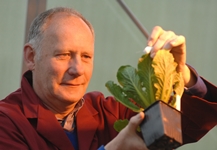News
See below for the latest news from the Warwick Crop Centre.
For our latest publications see Crop Centre in Print
Catching up with the fly
Article in the Crop Production Magazine: Aside from anecdotal evidence, there are big gaps in research into the pest known as bean seed fly. And with no chemistry available to control it, there’s no other option but to take integrated pest management to the next level, which is just what Becca McGowan, a PhD student at the University of Warwick, has spent the past three and half years researching alongside PGRO.
Warwick Crop Centre researchers speaking at AHDB Horticulture 2017 Narcissus Growers Workshops
John Clarkson, Andrew Taylor, Rob Lillwhite and PhD student James Syrett will be contributing to the AHDB Narcissus Growers Workshops to be held on:
17 May 2017, Pool Innovation Centre, Trevenson Road, Pool, Redruth, Cornwall, TR15 3PL
25 May 2017, Springfields Events & Conference Centre, Spalding, Lincolnshire PE12 6ET
Insecticide-based brassica seed treatment to help protect against Turnip yellows virus, estimated to save the industry £58M in 2015
 Research by Dr John Walsh from the School of Life Sciences, funded by the Horticultural Development Company, has provided the scientific evidence required to justify an Emergency Crop Protection Authorisation enabling the use of an insecticide-based seed treatment in the UK.
Research by Dr John Walsh from the School of Life Sciences, funded by the Horticultural Development Company, has provided the scientific evidence required to justify an Emergency Crop Protection Authorisation enabling the use of an insecticide-based seed treatment in the UK.
John’s research demonstrated the role played by peach-potato aphid in carrying Turnip yellows virus (TuYV), the most damaging of all viruses transmitted by aphids in brassica crops, which results in yield losses and tipburn after storage. The seed treatment technique protects plants from aphid attack for up to ten weeks after planting and effectively reduces and delays TuYV infections.
The Brassica Growers Association estimated that this has saved the industry around £58M in 2015 due to the reduced requirement for additional insecticide treatments, and prevention of yield and storage losses. Current research funded by BBSRC is based on developing an integrated strategy for control of TuYV in crops.
